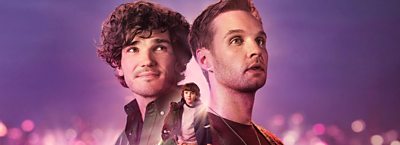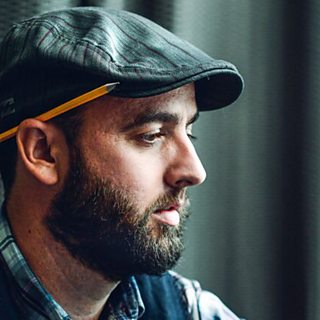Lost Boys and Fairies tells the fictional, tender, glittering story of Gabriel, a singer and artiste-extraordinaire at Cardiff’s queer club-space ‘Neverland’, his partner Andy and their journey to adoption. But Gabriel has a complex history and he will need to embark upon a journey of self-discovery before he can truly begin to parent 7-year old Jake.
Together with his partner, Andy, Gabe longs to adopt a child and to do so they must convince their social worker Jackie that they’re up to the task.
But Gabe is masking his demons: the effects of decades of shame having grown up in a society that overwhelmingly treated being gay as a sin; shame which Gabe is still processing.
Packed with songs, often used in surprising ways, Lost Boys & Fairies is a ‘coming of middle-age’ story, both bold and deeply heart-wrenching, filled to the brim with humour, redemption, and love.
Watch Lost Boys and Fairies on �鶹������ҳ��� One and �鶹������ҳ��� iPlayer from Monday 3rd June
Lost Boys and Fairies was developed as part of the �鶹������ҳ��� Writers Pilot scheme. It is created and written by Daf James and produced by Duck Soup Films.
How would you describe Lost Boys & Fairies?
I would describe Lost Boys & Fairies as a drama with music, that explores the themes of parents and children told against the backdrop of gay adoption, set in Cardiff.
It’s also a love story.
What inspired you to write it?
As with a lot of the stuff that I've written it's very personally inspired.
Though I draw from lived experience, I always adapt story. The themes and emotions resonate with my life but it’s not my autobiography; and roles like Andy, Emrys and Jake aren’t depictions of my family.
My husband and I first adopted eight years ago now. When we went through this process my world changed forever as a human, but also as an artist. I felt like I hadn't seen adoption represented authentically on screen, so it's something I feel really passionate about bringing to the television. That first year after adopting my kids was a challenging period because I went through so many emotions and feelings. My identity completely shifted; my frames of reference in this world shifted. I wanted to be able to put all of those things into a story.
How would you describe Gabriel and Andy's relationship? How did they first meet?
On the surface they're very different, I suppose – Gabriel is the artist, Andy is the accountant. They're incredibly understanding of each other. Andy is very stable, he's a rock and Gabriel needs that in his life. Gabe jokes about the moment when they first kissed in Neverland as the moment when Andy saved his life, because he was living a life of excess before they met.
But I would also say that Andy is attracted to Gabriel because Andy is also an artist in his soul. He's the homemaker, he is an extraordinary cook and baker, he has artistry in his fingers and in his heart. I think they bring out the best in each other.
Why have they decided they want to adopt?
They've decided to adopt a child because they've been together for a long time – eight years – and they've got what they consider to be a really stable relationship. Quite organically a space has opened up where they feel that they can share their love with somebody. Gabriel is conflicted about this, whether or not he's up to the challenge, which is part of the story.
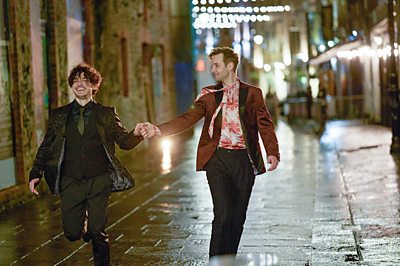
What are the hurdles Andy and Gabriel face in their journey to adoption?
The brilliant thing about adoption is the people guiding the adoption process – the social services – want you to succeed. Children need homes, children need love, they need people to take them in. The assessment is from a child-centred perspective, it's to make sure that you are capable of taking on children where the likelihood is that they've lived through trauma. It's ‘parenting plus’ in a way, if you're becoming a parent to an adopted child.
There's obviously a process that Gabriel and Andy have to go through. It's a personal process that makes you look and consider your own childhood, and the way that you were parented. In this story we see Gabriel facing a lot of the demons from his own past, his own childhood trauma that he hasn't processed yet. Going through this adoption process makes Gabriel look at himself, his relationship to his father, his relationship to who he was as a teenager and the things that he experienced there. That's all put under a magnifying glass, and those are the struggles that become challenging for him; in terms of whether or not he feels not only is he up to adopting a child, but whether or not he deserves to have a child. Gay shame has had that insidious effect on him: if as a child you’re constantly told by society that you are an abomination, often you grow up believing you don’t deserve to be loved or have a sense of self-worth.
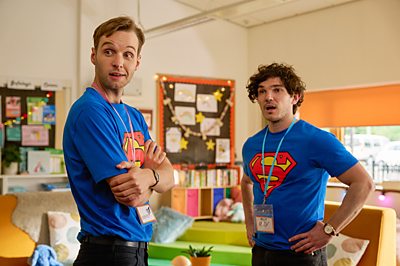
Why is it important to tell a story like this?
It's important for me to put this story on screen because it's a queer, bilingual, Welsh/English drama about adoption on the �鶹������ҳ���, which absolutely blows my mind. If somebody would have told me that as a kid that this kind of representation was going to be in the mainstream in this way, I wouldn't have believed it. This will be the most Welsh you’ve ever heard in a primetime �鶹������ҳ��� drama.
I think it's so important that we get to see these minority perspectives in the mainstream. It's my identity: I’m a queer, Welsh-speaking Dad. This is my normal.
But also, though it's a story about gay adoption specifically, I think these are themes that resonate with everyone. Everyone knows what it is to be a child. Many people contemplate if they want to become parents or not; and we've all been children to somebody.
Also, I'm a huge advocate for adoption, it's changed my life completely. If this story can encourage more people to look into it, I think that would be brilliant thing.
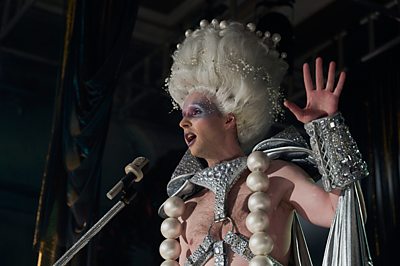
What are the key themes in Lost Boys & Fairies?
It's a show that looks at being a parent, parents and children. Beyond that, it's a show about identity, queerness, the Welsh language; and it’s a show about the diversity of love.
One of the other really crucial themes is one of trauma and shame - specifically gay shame. Thankfully we're living in a world now where gay people can adopt and get married. These are all things that when I was a kid, during the time of Section 28, I wouldn't have believed were even possible. When I got married to my husband, standing there was so deeply moving because we could now speak ‘the love that dare not speak its name’ in front of our community and family – our tribe – it was just extraordinary.
We exist in a space now where we feel relatively safe within our own communities. But it's easy to forget what it was like as a child growing up with the trauma of thinking you are an abomination. I was also very religious at the time, so when you grow up as a teenager thinking you are inherently evil or wrong and you can't share those thoughts, it has an insidious effect on who you are and what your identity becomes.
This is something I'm exploring with the character Gabriel - why he ends up in quite dark places and some of his behaviours. It's showing how toxic shame has had an impact on who he has become and his identity. And of course, when you become a parent, you are made to revisit who you are as a child. Certainly for me, when I first became a parent, all of this unprocessed stuff came out. I had to deal with it in order for me to be better equipped to deal with a child who themselves has lived through some incredible trauma. Gabriel needs to process his own trauma to be able to take on and deal with Jake's. This is how two ‘lost boys’ essentially find healing through each other and through the love that grows between the both of them.
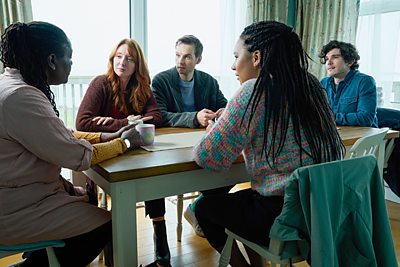
How would you describe the tone and visual style of the series?
It's a drama but there's comedy in it. I think humour is very disarming, and you can take your audiences with you on a journey into emotional depths if you can make them laugh too. Music is also an incredibly important part of the show. Sometimes – as he sings in Neverland – the songs are like soliloquies for Gabriel, we get a sense of his interior world through them; sometimes the music spills out of the boundaries of the club and take on another form within the narrative. It's not a musical as such, but it is a drama with songs.
There's also a lot of magic realism in it. I come from a theatrical background – I'm also a playwright, composer and performer – so I've always loved finding playful ways to tell my stories. I've taken a lot of the qualities of magic realism I’ve explored in theatre and brought them into my TV writing. That’s because I think it makes for the most authentic depiction of life. We exist in both a concrete reality and an interior world simultaneously; and so, what we often experience is mundane and epic at the same time. In the same way, we can laugh and cry from one moment to the next in the most profound situations. When my mother died I keened so violently and loudly I started laughing at the same time because I was so surprised by the animalistic noise I was making.
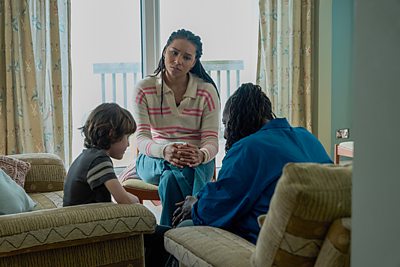
How has music influenced you in writing the Neverland sequences? Do songs help convey the character's inner struggles?
Music absolutely helps me write and always has. In fact, I would say because I'm a musician and a composer as well, I find writing scripts a musical experience. I tend to write them as pieces of music and that's why it's not just the words being said that matters to me, but the rhythm as well: the beat of dialogue, the pace of scene, the structure, or even how things are edited or cut together. I sense the structure of a script or a cut as a piece of music.
I've borrowed from the soundtrack to my life and I've brought that into Neverland. Musical punctuations help me to tell the story and to take the audience on an even more epic journey.
I composed the title song ‘Lost Boys & Fairies’ for a production of Peter Pan back in 2012 (and co-wrote the lyrics with playwright ). I’ve always wanted the song to have further life; the mood and essence of it is at the heart of the whole show.
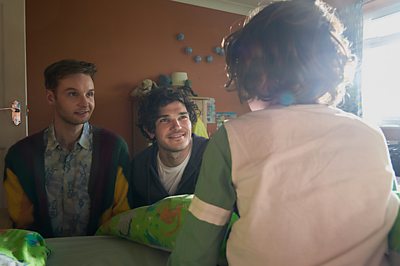
What advice would you give writers who want to draw on their own personal experience?
First of all, find your people. It's a vulnerable thing to be able to excavate your soul, excavate your past, and put it down on paper, then to share it.
I found my people with the producers, , and it's been the most beautiful process where I felt very safe all along the script writing process. The same happened when the �鶹������ҳ��� commissioners joined the journey and when we went into production. I feel very safe making this work. I was on set every day: it was a very collaborative, open, loving space.
I couldn't have asked for a greater director to make this work. led with such generosity and power, but also with total openness. He allowed my voice within that, it’s just been the most beautiful collaboration.
Because this is personally-inspired, finding a way of translating that into drama takes time. I think it's important to find a form that can hold your experience that isn't necessarily directly your experience. I've done that all through my writing career; my plays and radio plays often draw on my own experiences. All writers are different, of course, but writing for me is often a process of catharsis: I want to be able to work something out, process something in my past through giving it a structure. That helps me, and through being very personal, I'm hoping that it will resonate universally with a wider audience. It's taken me time to find a structure to hold my experiences in an adapted form.
-
Watch Lost Boys and Fairies from Monday 3rd June On �鶹������ҳ��� One and �鶹������ҳ��� iPlayer
-
Watch an interview with Daf James On the �鶹������ҳ��� Writers website
-
My Mother Taught Me How to Sing Read the script for Daf's previous �鶹������ҳ��� Radio drama and find out more on the �鶹������ҳ��� Writers blog
